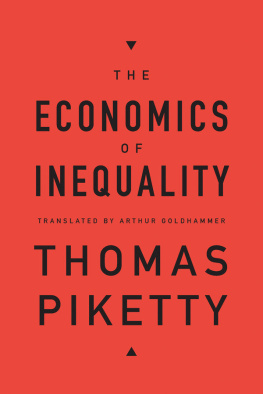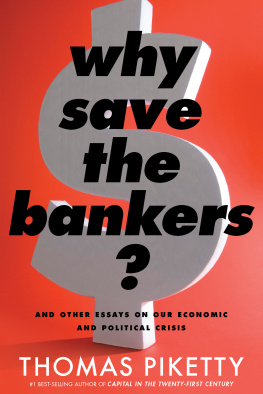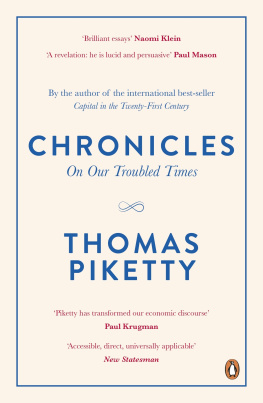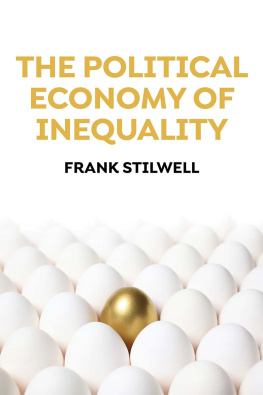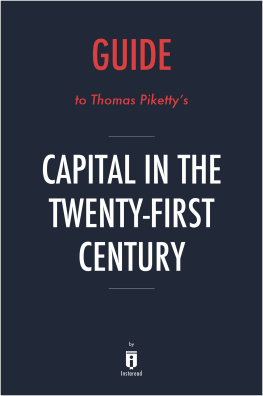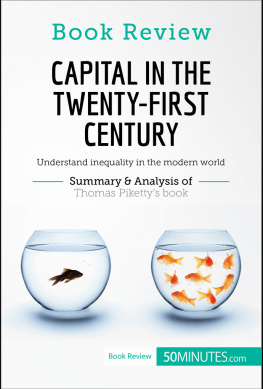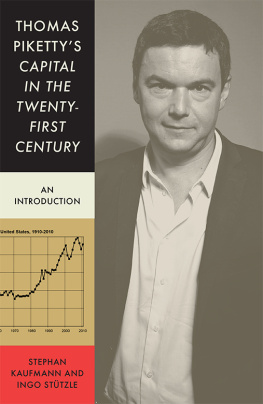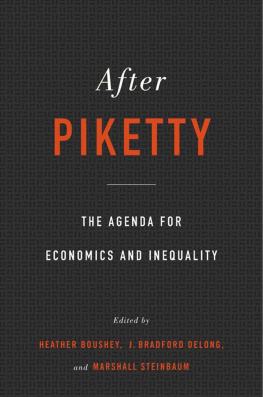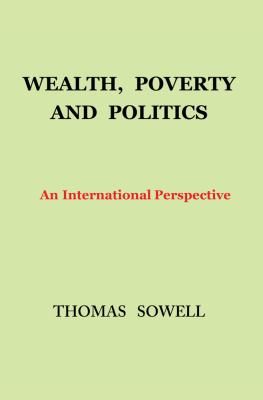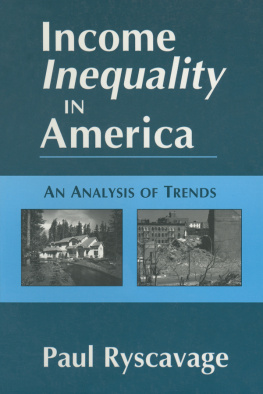THE ECONOMICS OF INEQUALITY

Thomas Piketty
Translated by Arthur Goldhammer
The Belknap Press of Harvard University Press

CAMBRIDGE, MASSACHUSETTS
LONDON, ENGLAND
2015
Copyright 2015 by the President and Fellows of Harvard College
All rights reserved
First published as Lconomie des ingalits
copyright ditions La Dcouverte, Paris, France, 1997, 2008, 2014
Jacket design by Graciela Galup
978-0-674-50480-6 (hardcover)
978-0-674-91558-9 (EPUB)
978-0-674-91557-2 (MOBI)
978-0-674-91556-5 (PDF)
The Library of Congress has cataloged the printed edition as follows:
Piketty, Thomas, 1971
[Lconomie des ingalits. English]
The economics of inequality / Thomas Piketty ; translated by Arthur Goldhammer.
pages cm
Includes bibliographical references and index.
1. Income distribution. 2. EqualityEconomic aspects. I. Title.
HB523.P54713 2015
339.2'2dc23 2015008813
Book design by Dean Bornstein
Contents
This book was written and first published in 1997. It was subsequently updated for several new editions, most recently in 2014. It should be noted, however, that the overall structure has not been changed since 1997 and that the work essentially reflects the state of knowledge and data available at that time. As a consequence, this book does not fully take into account the results of the past fifteen years of international research on the historical dynamics of inequality. In particular, recent research has demonstrated that there are important historical variations in the capital-income ratios and the capital shares in national income, and not only in the concentration of capital ownership at the individual level. That is, the macroeconomic or functional distribution of national income and national wealth is substantially less stable than what I was taught in graduate school and what I report in this book. The large historical variations in top income shares also receive insufficient treatment in the present book, because the corresponding research became fully available only recently. Readers interested in a detailed account of that more recent research and the lessons that can be drawn from it are advised to consult the World Top Incomes Database (available online) and my book Capital in the Twenty-First Century (Belknap Press, 2014).
The question of inequality and redistribution is central to political conflict. Caricaturing only slightly, two positions have traditionally been opposed.
The right-wing free-market position is that, in the long run, market forces, individual initiative, and productivity growth are the sole determinants of the distribution of income and standard of living, in particular of the least well-off members of society; hence government efforts to redistribute wealth should be limited and should rely on instruments that interfere as little as possible with the virtuous mechanisms of the marketinstruments such as Milton Friedmans negative income tax (1962).
The traditional left-wing position, passed down from nineteenth-century socialist theory and trade-union practice, holds that the only way to alleviate the misery of the poorest members of capitalist society is through social and political struggle, and that the redistributive efforts of government must penetrate to the very heart of the productive process. Opponents of the system must challenge the market forces that determine the profits of capitalists and the unequal remuneration of workers, for instance, by nationalizing the means of production or setting strict wage schedules. Merely collecting taxes to finance transfers to the poor is not enough.
This left-right conflict shows that disagreements about the concrete form and desirability of redistributive policy are not necessarily due to contradictory principles of social justice but rather to contradictory analyses of the economic and social mechanisms that produce inequality. Indeed, there exists a certain consensus in regard to the fundamental principles of social justice: if inequality is due, at least in part, to factors beyond the control of individuals, such as inequality of initial endowments owing to inheritance or luck (which cannot be attributed to individual effort), then it is just for the state to seek in the most efficient way possible to improve the lot of the least well-off (that is, of those who have had to contend with the most adverse factors). Modern theories of social justice have expressed this idea in the form of a maximin principle, according to which a just society ought to maximize the minimum opportunities and conditions available within the social system. The maximin principle was formally introduced by Serge-Christophe Kolm (1972) and John Rawls (1972), but one finds it more or less explicitly formulated in much earlier worksfor example, in the traditional idea that everyone should be guaranteed the broadest possible range of equal rights, a concept widely accepted at the theoretical level. Often, the real conflict is about the most effective way to improve the actual standard of living of the least well-off and about the extent of the rights that can be granted to all in the name of abstract principles of social justice.
Hence only a detailed analysis of the socioeconomic mechanisms that generate inequality can sort out the competing truth claims of these two extreme versions of redistribution and perhaps contribute to the elaboration of a more just and effective set of policies. The purpose of this book is to present the current state of knowledge as a first step toward that end.
The contrast between the left- and right-wing views sketched above highlights the importance of different systems of redistribution. Should the market and its price system be allowed to operate freely, with redistribution effected solely by means of taxes and transfers, or should one attempt to alter the structure of the market forces that generate inequality? In the jargon of economics, this contrast corresponds to the distinction between pure redistribution and efficient redistribution. Pure redistribution occurs when the market equilibrium is Pareto efficient, meaning that it is impossible to alter the allocation of resources and output in such a way that everyone gains, yet social justice nevertheless calls for redistribution from the better-off to the worse-off. Efficient redistribution occurs when the existence of market imperfections allows for direct intervention in the production process to achieve Pareto-efficient improvements in the allocation and equitable distribution of resources.
In contemporary political conflict, the distinction between pure and efficient redistribution is often conflated with the distinction between redistribution on a modest scale and redistribution on a large scale. The traditional right-left conflict has grown more complicated over time, however. For instance, some on the left advocate a guaranteed basic income for all citizens, to be financed by taxes without direct intervention in the market. This guaranteed basic income differs from Friedmans negative income tax solely by virtue of size. Broadly speaking, therefore, the question of how redistribution is to be achieved is separate from the question of the extent of redistribution. In this book I will try to show that it is best to treat the two questions separately, because they involve different analytical considerations and lead to different answers.
Next page
